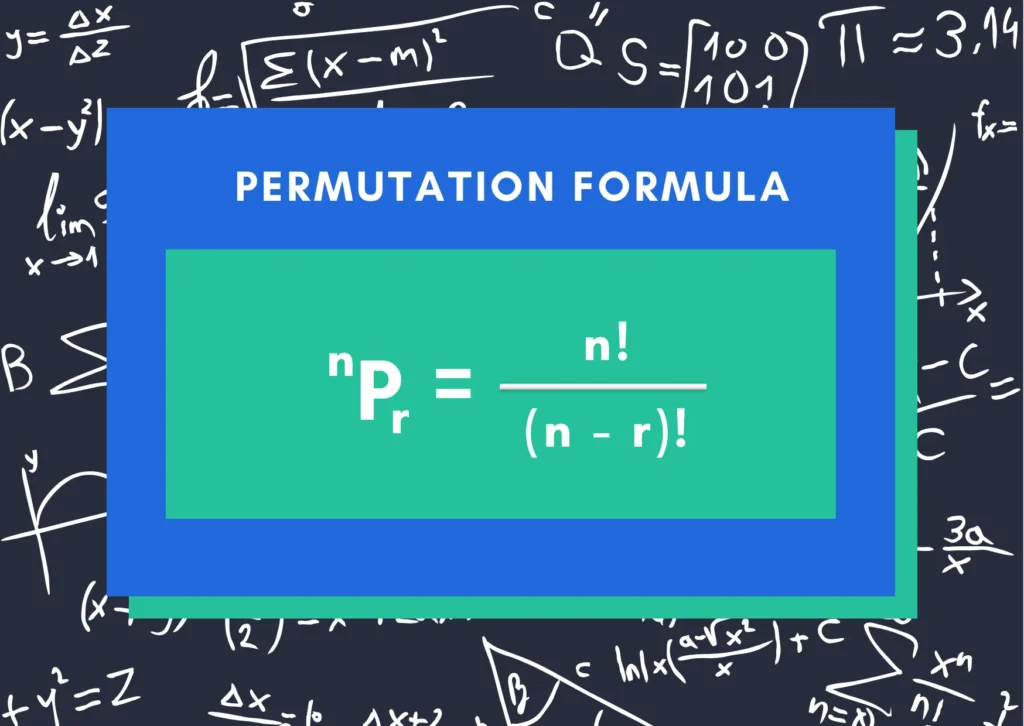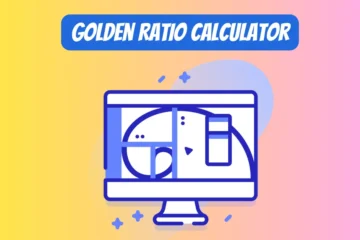Solve for Permutation (nPr)
In mathematics, a permutation of a set is an arrangement of its members into a sequence or linear order. The notation \( ^{n}P_{r} \) represents the number of distinct permutations of \( r \) elements from a set of \( n \) distinct elements.
Table of Contents
How to use this Permutation Calculator?
- Enter n Value: Input the value of “n” in the text-box provided.
- Enter r Value: Input the value of “r” in the text-box provided.
- Calculate Permutation: Click the “Calculate Permutation” button. The tool will calculate the permutation (nPr) based on the values of n and r you’ve provided.
- View the Result: The calculated permutation will be displayed below the buttons.
- Reset the Fields (Optional): To perform another calculation, click the “Reset” button. This will clear all the input fields and the result, allowing you to enter new values.
Unlocking the Secrets of Permutation: The Magic of Arrangement
Introduction: What’s the Big Deal About Permutation?
Ever wondered how many ways you can arrange a deck of cards, or perhaps, the different routes you could take on your way to school or work? If you’re nodding along, then you’re already thinking about permutations. But trust me, permutations are more than just a puzzle or a decision headache. They’re a key concept in mathematics and beyond, affecting fields as diverse as statistics, computer science, and even biology. So, buckle up as we unravel the world of permutations together!
What Exactly Is a Permutation?
Let’s get the definition straight first. A permutation is an arrangement of items in a specific order. Let’s say you have three books: A, B, and C. The different ways you can arrange them on a shelf are ABC, ACB, BAC, BCA, CAB, and CBA. That’s 6 different permutations!
In math-speak, if you have n different items and you want to arrange r of them, then the number of permutations nPr is calculated using the formula:

Where n! (read as “n factorial“) means n × (n − 1) × (n − 2) × … × 1.
The Daily Life of Permutations: Where Can You Find Them?
- Playlist Creation: When you’re arranging the songs in your playlist, that’s a permutation.
- Social Media Passwords: The arrangement of characters in your strong, secure password is a permutation.
- Team Lineups: Whether it’s baseball, soccer, or any team sport, the order of players is a permutation.
- Cooking: The sequence in which you add ingredients can be a permutation that affects the final taste.
- Traveling: Deciding the sequence of cities or places to visit on a trip involves permutations.
- Bookshelf Arrangement: The order in which you place books on a shelf is a permutation.
- Closet Organization: Arranging your clothes by color, type, or any other attribute involves permutations.
- Photography: The sequence of photos in a slideshow or portfolio is a permutation.
- Television: The order of shows in a TV series marathon is a permutation.
- Job Interviews: Different orders of questions asked can yield different responses, hence a permutation.
- Weddings: The order in which events occur in a wedding ceremony can be considered a permutation.
- Class Scheduling: Arranging the sequence of subjects in a school timetable involves permutations.
- Online Shopping: Sorting products by price, rating, or any other attribute involves permutations.
- Public Speaking: The sequence of points or slides in a presentation is a permutation.
- Gaming: The order in which you play cards in a card game involves permutations.
- Voting Systems: Different sequences of candidates on a ballot paper could influence voter choice.
- Training Regimens: The order of exercises in a workout routine is a permutation.
- Grocery Shopping: The path you take through a grocery store, picking items in a certain order, is a permutation.
- Stock Market: The sequence in which you buy or sell stocks can be crucial, another example of permutation.
- Meal Prepping: Planning the sequence of meals for the week involves permutations.
Practical Application of Permutation in Various Fields
- Mathematics
- Combinatorial Mathematics: Fundamental to counting different possible orders of a set of objects.
- Probability and Statistics: Used in calculating probabilities and statistical measures.
- Computer Science
- Algorithms: Used in sorting algorithms, search algorithms, and data structure manipulation.
- Cryptography: Permutation functions are often used in cryptographic algorithms.
- Biology
- Genomics: Permutations are used to assess the significance of observed genomic patterns.
- Phylogenetics: Tree-building methods may involve permutations to assess the most likely evolutionary relationships between species.
- Chemistry
- Stereochemistry: Calculation of possible isomers.
- Statistical Mechanics: In the calculation of microstates of particles.
- Physics
- Quantum Mechanics: In dealing with identical particles and their possible states.
- Statistical Mechanics: For counting the number of possible states that particles can be in.
- Operations Research
- Scheduling and Routing Problems: Such as the Traveling Salesman Problem and job scheduling.
- Economics
- Game Theory: Permutations can help calculate different strategies and outcomes.
- Linguistics
- Syntax and Semantics: Permutation tests can be used to assess the structure and meaning of sentences.
- Psychology
- Experimental Design: Permutation tests are often used in psychological research to generate all possible conditions or orders of conditions.
- Finance
- Risk Assessment: Used in portfolio optimization and risk assessment models.
- Geography
- Spatial Analysis: Permutations are used in spatial statistics and geostatistics.
- Music and Arts
- Composition and Arrangement: Different permutations of notes, rhythms, or other elements can be used to create variations.
- Puzzles and Games
- Solving Puzzles: Like Rubik’s Cube, Sudoku, and other combinatorial games.
- Medicine
- Clinical Trials: Permutation tests can be used to randomize treatment and control groups.
These are just some of the fields where permutations play an essential role; the concept is truly interdisciplinary.
Who Benefits from Understanding Permutations?
Understanding permutations isn’t just for mathematicians. Here’s a quick rundown:
- Students: Great for learning statistical concepts and problem-solving.
- Teachers: An excellent tool for explaining statistical theories and ideas.
- Professionals: Engineers, data scientists, and even market analysts regularly use permutations in their work.
Wrapping It Up: The Power of Arrangement
So, the next time you’re deciding on the sequence of songs for a playlist or figuring out your travel itinerary, remember that permutations are at play. This simple yet powerful mathematical concept provides the foundation for solving complex problems in various fields. And now that you’re in the know, the sky’s the limit for how you can use permutations in your life!









